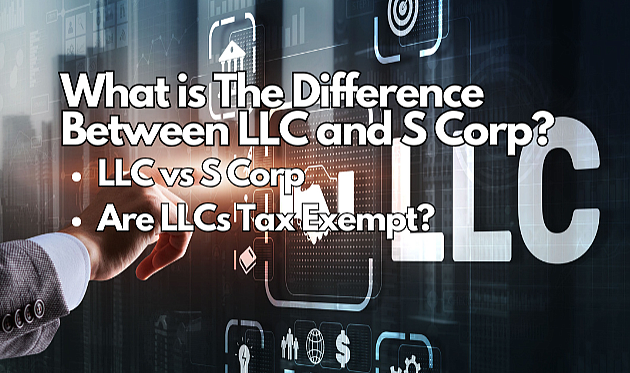When exploring the realm of business structures a question that often arises is; what is the difference between LLC and S Corp? Understanding the nuances of business entities can feel overwhelming. Its crucial, for entrepreneurs who want to achieve success.
What Is LLC?
An LLC, which combines elements of corporations and partnerships provides liability protection by safeguarding the assets of its members from business debts. Unlike corporations LLCs offer management structures. To create an LLC you'll need to submit articles of organization to the state agency and pay the required fees.
Are LLCs Tax Exempt?
Limited Liability Companies (LLCs) do not automatically qualify for tax status. The way they are taxed depends on the classification they choose. By default if an LLC has one member it is taxed as a proprietorship; whereas if it has multiple members it is taxed as a partnership. However there is an option for LLCs to select taxation by submitting IRS forms.
Are LLCs Pass-Through Entities?
Indeed limited liability companies (LLCs) are classified as default pass through entities. This signifies that the business itself does not face taxation. Instead any profits or losses generated by the LLC are passed on to members. Reflected in their personal tax filings. This setup effectively prevents the occurrence of taxation which can burden corporations and ensures that LLC members are subject, to taxation only once, on their income derived from the LLC.
Are LLCs Double Taxed?
No limited liability companies (LLCs) prevent the issue of taxation that some corporations face. LLCs are structured as pass through entities meaning that the profits and losses are directly attributed to the tax returns of the members. This ensures that income is only taxed once at the level than being taxed at both the corporate and shareholder levels.
Are LLCs Incorporated?
LLCs are not considered "incorporated." Instead they are "formed". Organized." Although they provide liability protection, to corporations, their structure and the process of their formation are different. Corporations go through the incorporation process while LLCs submit articles of organization to the state.
Are LLC Distributions Taxable?
Distributions, from an LLC may be subject to taxation depending on the type of distribution and the tax classification of the LLC. Generally taxes are paid by the members based on their portion of the profits earned by the LLC than on the distributions themselves unless those distributions exceed the members investment, in the LLC.
Are LLC Members Considered Employees?
LLC members are not automatically considered employees. While they may receive distributions, from profits these are not classified as wages. However if LLC members provide services to the company and receive compensation, for their work they can be treated as employees.
Create An LLC
In order to set up an LLC you need to submit articles of organization to the Secretary of State in your state and pay the fees. It's important to review the regulations as each state has its own specific requirements.
Can An LLC Be An S Corp?
Indeed it is possible for a Limited Liability Company (LLC) to opt for S Corporation tax status by submitting Form 2553 to the Internal Revenue Service (IRS). This decision alters the taxation method applied to the LLC and may bring forth advantages in terms of self employment taxes.
Creating An LLC In Texas
To form an LLC, in Texas you need to submit a Certificate of Formation to the Texas Secretary of State and pay the required fee. Its recommended to create an operating agreement although it is not obligatory.
Can An LLC Buy A House?
Definitely an LLC has the ability to buy property, which includes houses. Many real estate investors opt for using LLCs when acquiring properties because it provides liability protection by keeping assets separate, from liabilities related to the property.
Can An LLC Be A Nonprofit?
While a limited liability company (LLC) cannot be classified as a nonprofit, in the sense it is possible for a nonprofit organization to possess an LLC. This arrangement enables the nonprofit to safeguard and segregate its assets effectively.
Creating An LLC In Florida
To establish a Limited Liability Company (LLC) in Florida individuals are required to submit the Articles of Organization to the Florida Division of Corporations and fulfill the payment. Furthermore it is essential for LLCs, in Florida to file reports as, per state regulations.
Cheapest Way To Start An LLC In Texas
The cost effective way to create an LLC, in Texas is, by filing the Certificate of Formation yourself without using third party services. However it is advisable to consult with a professional to ensure that all requirements are met and the formation process is done correctly.
Can LLC Owner Collect Unemployment?
The eligibility criteria, for unemployment benefits differ from state to state. Depend on the way the LLC is structured. In some states LLC owners may be eligible if they have contributed to the unemployment system. Its not a guaranteed benefit, across all states.
Do LLCs Get 1099?
LLCs may receive a 1099 form if they provide services to another company. However there are some exceptions, such, as LLCs that are taxed as corporations.
Do LLCs Expire?
Limited Liability Companies (LLCs) do not have an expiration date. However they can be dissolved either by the members voluntarily or involuntarily by the state in cases of non compliance such, as failure to file reports.
Do LLCs Have CEOs?
Limited Liability Companies (LLCs) do not have a fixed structure to corporations. Unlike entities LLC members are not bound by specific titles such, as CEO. Instead they have the flexibility to choose any title that aligns with their roles and responsibilities.
Do LLCs Have Bylaws?
Limited Liability Companies (LLCs) differ from corporations in that they do not use bylaws. Instead they rely on operating agreements. These agreements define the LLCs management framework assign member roles and establish procedures to ensure business operations and clarify member responsibilities.
Do LLCs Have Shares?
Limited Liability Companies (LLCs) operate differently from corporations when it comes to ownership. Of issuing shares they have membership interests that signify ownership within the LLC. These interests play a role, in determining how profits, losses and voting rights are distributed among the members.
Does LLC Protect Personal Assets?
One of the benefits of having an LLC is that it offers personal liability protection. This means that the personal assets of LLC members, such, as their homes and savings are usually protected from business debts and liabilities. It provides an added layer of security.
How Are LLC Members Taxed?
Taxation, for members of an LLC is determined by the tax classification of the LLC. If the LLC is treated as a pass through entity (which's typically the default for LLCs) members are required to report their portion of profits and losses, on their personal tax returns and they pay taxes based on their individual tax rates.
How Do LLCs Raise Capital?
Limited liability companies (LLCs) have options, for obtaining capital. They can bring in members who will invest in the company seek loans from institutions or form investment agreements, with external parties. It is essential to evaluate each method and choose the one that aligns best with the needs of the business.
How Does LLC Credit Work?
Limited liability companies (LLCs) have the ability to establish their credit separate, from the credit of its members. This separation proves advantageous when in need of business loans, credit cards or vendor lines of credit as it does not have any impact, on the credit scores of the LLCs members.
Is LLC A Business License?
An LLC is actually a form of business structure and not just a mere business license. Once you establish an LLC it's possible that your business might still require licenses or permits based on its operations and where it is located.
Is LLC Capitalized?
When mentioning a limited liability company (LLC) by its name like "Smith Enterprises, LLC " it should be capitalized. However when discussing the concept of this type of entity it can be written as "llc."
Is LLC A Sole Proprietorship?
There is a distinction, between an LLC and a sole proprietorship. Although a single member LLC can be taxed in a way, to a proprietorship the LLC offers personal liability protection that sole proprietorships do not provide.
What Is An S Corp?
An S Corporation, often referred to as an S Corp is a type of corporation that meets criteria set by the IRS. What makes it unique is that it allows the income, deductions and credits to be passed directly to the shareholders, for tax purposes. This means that there is no taxation involved. The beauty of this structure lies in its ability to combine the advantages of a structure, with the benefits of pass through taxation.
Are S Corp Distributions Taxable?
Distributions, from S Corporations may have tax implications. Usually they are not subject, to self employment taxes. The tax consequences vary based on the shareholders stock basis. If the distribution exceeds the companys earnings.
Are S Corps Taxed?
S Corporations do not face corporate level taxation. Instead the income or losses are passed on to shareholders, who then report them on their tax returns. This arrangement helps prevent the issue of taxation that is often associated with corporations.
Are S Corp Dividends Taxed?
S Corporations usually don't pay out dividends in the sense. Instead they provide distributions to shareholders which're generally tax free, up to the amount of their stock investment. However if these distributions exceed the shareholders investment they may be subject, to capital gains taxes.
Are S Corporation 1099?
S Corporations do not receive a 1099 form, for their income. However they may choose to issue a 1099 form to contractors or service providers whom they have paid during the year.
What Companies Are S Corporations?
Any company that meets the criteria set by the IRS has the option to choose S Corporation status. The eligibility requirements include having, than 100 shareholders with certain permissible shareholders such, as individuals and specific trusts and maintaining a single class of stock.
When Are S Corp Taxes Due?
S corporations must file their tax returns using Form 1120S and the deadline, for calendar year corporations is usually March 15th. If additional time is necessary extensions can be requested.
What Are S Corp Tax Rates?
S Corporations do not have predetermined tax rates as they are considered pass through entities. Shareholders are responsible, for reporting the income or loss of the S Corp on their tax returns. Will be taxed according to their individual tax rates.
Can An S Corp Own An S Corp?
No it is not possible for S Corporations to possess ownership of S Corporations. The Internal Revenue Service (IRS) has established criteria regarding ownership, for S Corps, which explicitly excludes S Corps, most trusts and partnerships, from being shareholders.
Can A Partnership Own An S Corp?
Typically partnerships are not allowed to be shareholders, in an S Corp. The IRS limits ownership in an S Corp to individuals, specific trusts and estates. This restriction ensures that the entity maintains its pass through nature.
Can I Retroactively File As An S Corp?
Absolutely, but there are some conditions to consider. You have the option to submit a request, for a S Corp election to the IRS; however it's important to note that approval is not guaranteed. It is crucial to provide an explanation for the delay and ensure that all tax filings are in accordance with the S Corp status, for the retroactive period.
Can An LLC Be A Shareholder In An S Corp?
Usually that wouldn't be the case. However if an LLC has one owner and is considered as a proprietorship, for tax purposes it might be permitted to become a shareholder of an S Corp.
When Did S Corporations Come Into Existence?
S Corporations were first introduced in the Revenue Act of 1958 which aimed to create a fairer business environment, for enterprises. The goal was to provide them with the advantages of liability without being subjected to double taxation.
Did 8879-CORP Replace 8879-S?
No Form 8879 S is designed specifically for S Corporations whereas Form 8879 CORP is applicable, to types of returns. Both forms have functions. Play important roles in the process of filing taxes.
Do S Corp Owners Qualify For ERC?
Certainly! Owners of S Corporations can indeed qualify for the Employee Retention Credit (ERC) although there are criteria that need to be met. This credit is intended to incentivize businesses to retain their employees during times of hardship.
Do S Corps Have Operating Agreements?
No S Corporations utilize bylaws of operating agreements. Bylaws serve as a guide, for the corporations operations and management. Conversely operating agreements are employed by Limited Liability Companies (LLCs) to delineate member roles, profit distribution and other internal procedures.
Does S Corp Protect Personal Assets?
Indeed S Corporations provide a level of liability protection, like traditional corporations. This implies that the personal assets of shareholders are generally safeguarded against business debts and liabilities offering an added sense of security.
Does S Corp Pay Self-Employment Tax?
No self employment tax does not apply to the earnings of an S Corp. However it is important, for owners who are actively involved in the operations of the S Corp to receive a salary, which's subject, to payroll taxes.
Does S Corp Have To File Quarterly?
Although it is not required for S Corps to submit tax returns they may still need to make estimated tax payments especially if the corporation anticipates having a tax liability.
Does S Corp Require Payroll?
If an S Corporation has employees, including shareholder employees who are actively engaged in the business it is required to process payroll. This involves making sure that the necessary taxes are withheld and all the required tax filings are completed.
What Are The Benefits Of Having An S Corp?
S Corporations provide benefits. They allow for pass through taxation, which helps avoid taxation. Additionally they offer liability protection safeguarding assets. Moreover owners can potentially save on self employment taxes by receiving salaries.
Does Michigan Have S Corp Tax?
Michigan imposes the Corporate Income Tax (CIT) on S Corps in situations. However as S Corps are pass through entities the main responsibility, for taxes lies with the tax returns of the shareholders.
Does Hawaii Have S Corp Tax?
In Hawaii S Corps are not subject, to entity level taxation. Instead the income generated by these corporations is distributed to shareholders who're responsible, for paying state income tax on their returns.
How Many Employees Can An S Corp Have?
S Corporations do not have any limitations, on the number of employees they can hire. However it's important to note that there is a shareholder limit imposed which is set at a maximum of 100 individuals.
How To Check S Corp Status Online?
To confirm the status of an S Corp you can search either the database of the IRS or the business registry of the state where the corporation is registered. This will ensure that the entity is, in standing and has made an election to be treated as an S Corp.
How To Start An S Corp?
To start an S Corp you'll need to follow two steps. First establish a corporation in accordance, with the guidelines set by your state. After that submit Form 2553 to the IRS to officially elect S Corp status. This election allows the corporation to take advantage of the benefits of pass through taxation.
The Similarities Of LLCs And S Corps
Both Limited Liability Companies (LLCs) and S Corporations (S Corps) provide a shield, against liability safeguarding the assets of their members or shareholders from any business related liabilities. Moreover both types of entities enjoy the advantage of pass through taxation, where the business itself's not subject, to taxes. Instead the income or losses are reported on the personal tax returns of the owners.
What Is The Difference Between LLC And S Corp?
The primary distinctions, between LLCs and S Corps revolve around their ownership limitations, management frameworks and approaches to employment taxes. Although LLCs provide leeway in terms of management and profit sharing S Corps may offer opportunities for reducing self employment taxes; however they do come with stringent requirements, for ownership.
Is S Corp Better Than LLC?
The decision, between choosing an S Corporation (S Corp) or a Limited Liability Company (LLC) depends on the requirements of your business. Opting for an S Corp can bring benefits in terms of saving on self employment taxes for business owners who are actively involved. On the hand LLCs offer flexibility when it comes to managing the company distributing profits and structuring ownership.
What Are The Tax Differences Between S Corp And LLC?
Both S Corporations (S Corps) and Limited Liability Companies (LLCs) enjoy the advantage of pass through taxation. They differ in terms of how employment taxesre handled. In the case of S Corps owners are required to pay themselves a " salary," which's then subject, to payroll taxes. On the hand all income earned by an LLC member may be subject, to self employment taxes unless the LLC chooses to elect S Corp status.
Management Structure of LLCs vs. S Corporations
What is the difference between LLC and S Corp in terms of management?
LLCs: The great thing, about an LLC is its flexible management structure. As the owners of the LLC you have the option to handle everything yourselves or appoint managers to oversee operations. Unlike business types there's no need, for a board of directors or officers which makes it much simpler for business owners to run things smoothly.
S Corps: S Corporations have a structured framework. They necessitate the presence of a board of directors and officers. Shareholders have the responsibility of electing the board, which in turn selects the officers. This particular structure can prove advantageous, for businesses seeking a corporate arrangement.
Tax Liability and Reporting Requirements
Another area where one might ask, what is the difference between LLC and S Corp? is in their tax implications.
LLCs: By default when it comes to taxes LLCs are classified as pass through entities. This implies that the company itself is not responsible, for paying taxes. Instead any profits or losses are passed on to the members, who then report them on their tax returns.
S Corps: Similar, to LLCs S Corporations are also considered pass through entities. However it is important to note that only the wages of the shareholder who's an employee are liable for employment tax. Any additional income is distributed as a dividend potentially resulting in savings, on self employment taxes.
Can You Be Both an LLC and an S Corp?
What is the difference between LLC and S Corp when it comes to dual classification? It's actually quite fascinating that they're not completely separate, from each other. A limited liability company (LLC) has the option to be taxed as an S Corporation by submitting Form 2553 to the Internal Revenue Service (IRS). This could potentially bring some tax advantages. The LLC needs to fulfill requirements in order to be eligible.
Can an S Corp Invest in an LLC?
Certainly it is possible for an S Corporation to make investments in an LLC. However it is important to note that if an S Corporation becomes a member of an LLC, the income, deductions and credits of the LLC will pass through to the S Corporation. This can impact the tax status of the S Corporation. It is advisable to seek guidance, from a tax professional.
When Should an LLC Become an S Corp?
What is the difference between LLC and S Corp when it comes to transitioning? An LLC may choose to opt for S Corp status under the circumstances;
- When the business begins making profits.
- When the owners wish to reduce their self employment tax burden.
- When the business structure necessitates a management system.
When Can an LLC File as an S Corp?
To elect S Corporation status an LLC needs to submit Form 2553 to the IRS. However there are criteria that must be met;
- The LLC should be an entity.
- Its shareholders must fall within the permitted categories, such, as individuals, specific trusts and estates.
- The number of shareholders cannot exceed 100.
- The LLC can only have a class of stock.
Who Pays More Taxes, an LLC or S Corp?
The final question in our exploration of what is the difference between LLC and S Corp revolves around taxes. Determining the option is not a task. Even though both S Corporations and pass through entities have their advantages some businesses might find the potential savings, on self employment taxes more enticing with an S Corp. However it's important to note that the overall tax liability can vary based on factors, like income level, state taxes and specific deductions.
Final Thought
In the vast landscape of business entities, discerning what is the difference between LLC and S Corp is essential. Both types of structures provide benefits that are customized to meet the requirements of businesses. As you start your journey, as an entrepreneur let this guide be a guiding light that helps you select the path that best aligns, with your vision and objectives.









